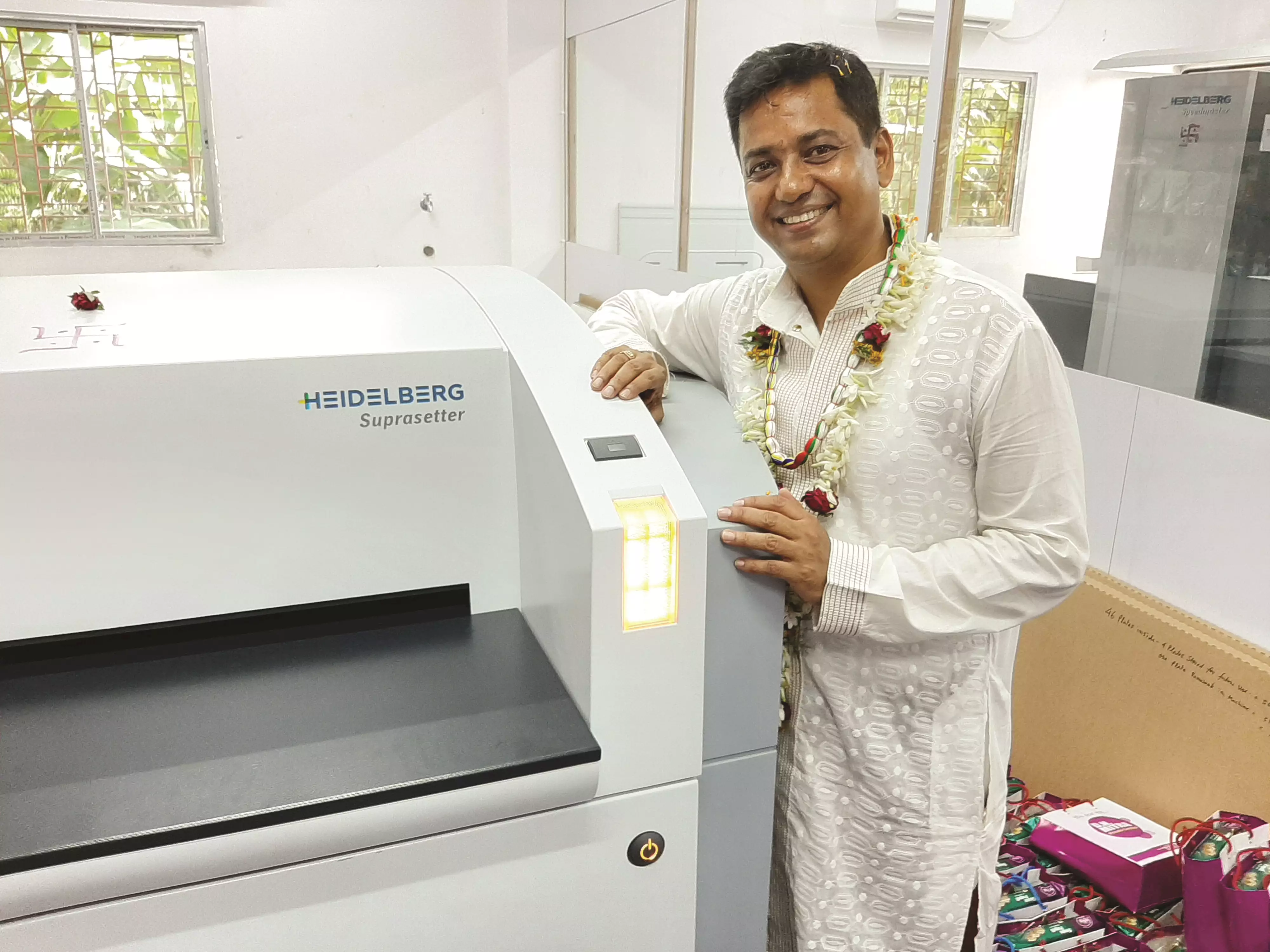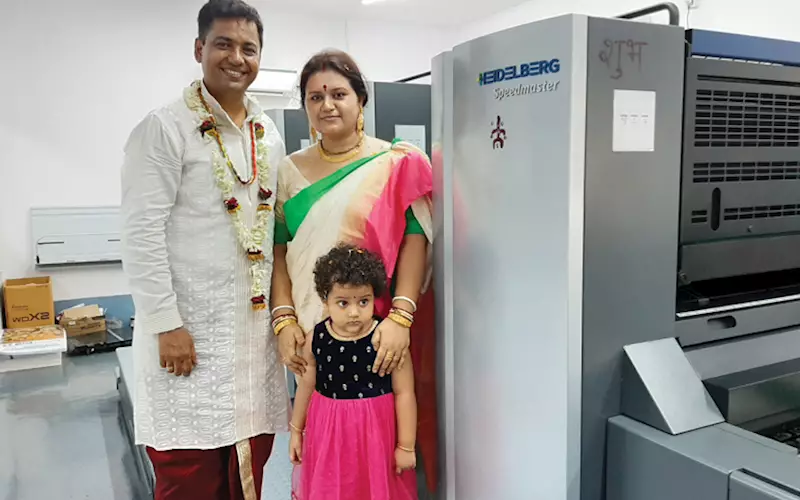Bengal’s digital powerhouse DN Mitra eyes the offset market with Heidelberg
In a story almost unique in the industry, the Ranaghat, West Bengal-based photo printing firm has undertaken a reverse journey from digital to offset. Rahul Kumar has the details
15 Oct 2019 | By PrintWeek India
West Bengal is usually seen as a place frozen in the past. It’s true to a certain extent, but the City of Joy is no longer immune to the winds of change. We saw an example of this when 85-year-old legacy photo printing firm, New DN Mitra Digital Color Film Lab, in Ranaghat, Nadia, recently entered into offset printing with an array of equipment from Heidelberg.
These include Heidelberg Speedmaster SX74 printing press, Heidelberg Suprasetter A75 CTP, Heidelberg Saphira range of consumables, Heidelberg Saphira APD 100 thermal digital printing plates,
Polar 115 PF paper cutting machine and Stahl Ti 52 paper folding machine.
According to Somnath Mitra of DN Mitra, fondly called Piku Da in the industry, the offset setup is fully equipped for commercial and promotional jobs, but soon it will be capable of handing books production as well. “For this, we have placed an order for a binding machine as well,” he says.
Up next, Mitra wants to expand into packaging, starting with paper and board and later, flexible.
Besides Ranaghat, the company also has units in Kolkata and Siliguri.

Somnath Mitra (centre) with the Heidelberg India team
At the first glance, the plans may look overtly ambitious, but for DN Mitra, established by well-known photographer Devendra Nath Mitra in 1930s, the growth with the shift in technology has been a slow and steady process. Starting with photography, as the third generation Somnath Mitra took over the business from his photographer father Amal Kumar Mitra, the company has gone through all the changes, from black & white to colour photography, from analogue to digital.
“We opted for a complete range of Heidelberg solutions, from pre-press to post-press to navigate the next level of growth. We see it as the perfect game plan for our foray into commercial printing,” says Mitra.
The new Heidelberg Speedmaster SX 74 offers technical advantages, quality and performance. “Production is already in full-swing and our print buyers are clearly enthusiastic about the quality of output,” he adds.
Designed for high productivity, the SX 74 provides flexible processing of different production run lengths and accommodates a wide array of substrates from thin sheets to boards, ranging in thickness between 0.03-mm and 0.6-mm. “We appreciate the Heidelberg team for recommending the right equipment our business needed,” he adds.
A compact platesetter, Heidelberg’s Suprasetter A75 CTP facilitates fully automated plate loading, offering configuration flexibility for conventional, process-free and chemical-free thermal plates.
With a small footprint, and low energy consumption, the A75 is one of the most eco-friendly platesetters in its class. The A75 supports small and medium format classes and ensures production reliability through the Intelligent Diode System (IDS).
Growing with time
It all started around 2000, when Mitra started to look for new technology for the photo business, even when black & white photos were still in demand. Soon, the entire printing process shifted from analogue to digital, from mono to colour. “I remember I asked my father to invest in colour printing. But he was sceptical as to how we will manage additional printing work, because at that time the pressure was immense for black & white photographs,” Mitra says.
In 2001, the company lost around Rs 10 lakh in a joint venture. “I had a good relationship with Capital Photo Service, Kodak’s sole distributor in the city, and they gave a machine without any advance. My father was certain that I’ll fail, and I did,” Mitra says.
But failure could hardly stop him. He tried again in 2003 with a Noritsu 2600 E printing press. “The digital printing press started functioning during Durga Pooja. The print quality was fantastic and the response from the market was tremendous. This helped our business gain a momentum. In six months, I paid the entire amount of machine. No one travelled to Kolkata from Ranaghat for their jobs because they got their jobs done within time and economically,” he says.

Mitra: My business is based on my confidence
Going digital
By then digital printing had taken over the market and the company had installed two digital printing presses. Following this, Mitra again went to Capital Photo Service and asked them for a new and heavy-duty machine. “I went to the West Bengal Finance Corporation for a loan and it granted me Rs 42 lakh. I was supposed to pay the loan in five years, but I paid it in three years time,” Mitra says.
With digital performing exceptionally well, the company ventured into wide-format printing in 2008, and later, installed two HP Indigo digital printing presses.
The Kolkata unit came up in 2015. Around the same time, Mitra met with the Heidelberg team in Kolkata and discussed an offset set up. “Both Heidelberg and I were confident of the huge investment. I visited Drupa 2016, but the project couldn’t take off due to financial issues,” he says.
Three years later, it’s back on track.
Confidence and experience
“My business is based on my confidence, gut feeling and experience,” Mitra says. “We were the first photo lab to go for HP Indigo in this particular geography, that too, not one but two.”
Traditionally, Kolkata and nearby areas are dominated by pre-owned machinery. Under the circumstances, Mitra took a risk by investing in new machines, and it has paid off.
“My business model gives me the confidence. There is no dearth of work. Most of my customers are small printers, graphic designers, freelancers and people from the industry who do not have the facility to print and the capacity to install machines for business,” he says.
Around 200 people work in all its units, including the newly constructed Ranaghat unit comprising 42,000-sqft area with basement, ground and four floors.
Right now, the company is targeting 30 jobs of varied lengths per day. “In future, I would like to entertain every kind of printing. I want establish DN Mitra as a place where a customer can meet all of his printing needs,” Mitra concludes. “We are excited with our recent acquisitions and look forward to the next phase of business evolution.”












 See All
See All